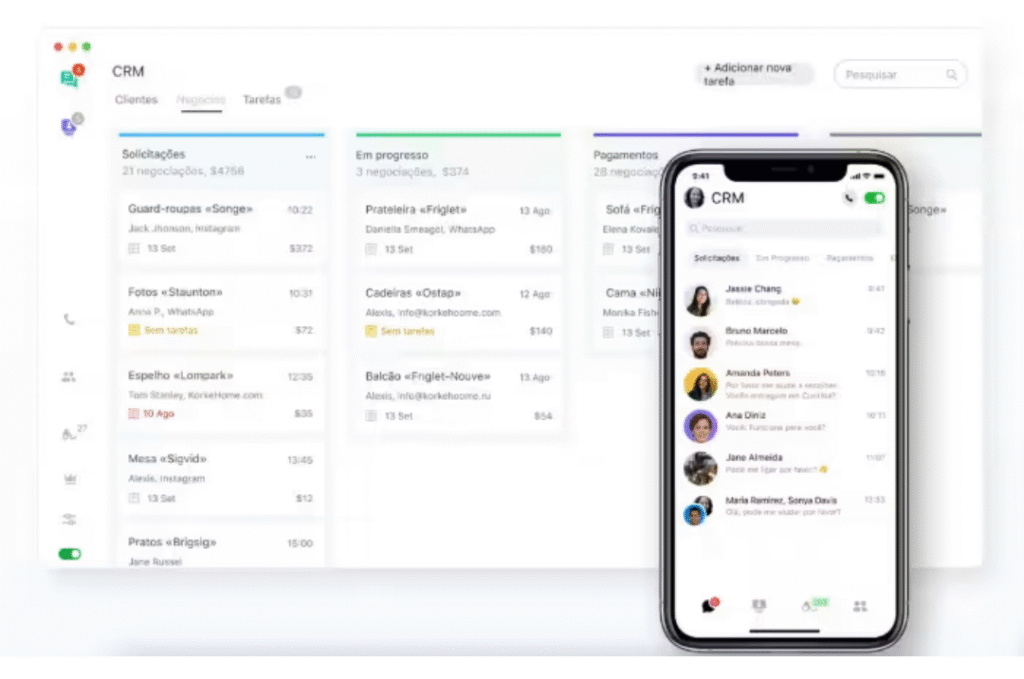Customer relationship management is a set of strategies aimed at attracting, monitoring, engaging, and building customer loyalty at all stages of the purchasing journey.
Maintaining a strong connection with customers involves several elements, such as ensuring quality delivery, aligning expectations, providing a good experience, supporting customer success, increasing satisfaction, encouraging repeat purchases, and fostering loyalty.
For this relationship to be well-managed at scale, it is essential to combine technological resources with personalized service, integrating sales, support, and customer service teams.
According to Grand View Research, the CRM software market is expected to experience average annual growth of 14.6% between 2025 and 2030, reaching an estimated value of US$163.16 billion by the end of that period.
Although many people associate the acronym with just a commercial system or application, the concept goes far beyond a tool, representing a comprehensive method of managing and interacting with customers.
With that in mind, in this article you’ll understand what customer relationship management is, why it’s essential for companies of all sizes, and how to choose the most appropriate tool to maximize its potential.
What is customer relationship management?
Customer relationship management encompasses practices and strategies aimed at strengthening the connection between a company and its audience, providing more positive and consistent experiences.
To achieve this, one of the main allies is technology, especially tools developed to facilitate interaction and follow-up on each contact.
These solutions are known as CRM, which stands for Customer Relationship Management. More than a tool, CRM represents a comprehensive approach to managing relationships with consumers, whether they are current or potential customers.
Customer relationship management is based on the intelligent use of data: collected and analyzed information allows for a better understanding of each customer’s profile, behavior, and needs.
From this, it’s possible to structure action plans focused on goals such as conversion, retention, loyalty, and customer base growth.
CRM platforms are designed to centralize and organize this information, acting as true intelligent databases.
By recording interactions such as phone calls, email exchanges, or meetings, the system not only stores them but transforms them into valuable insights to personalize service and optimize processes.
With well-implemented customer relationship management, companies can build more lasting relationships, offer tailored solutions, and improve the shopping experience.

Why invest in a customer relationship management platform?
Whether through direct service or other channels, the way a company interacts with its customers is crucial to creating a strong, trusting bond.
CRM tools offer essential support in this process, allowing you to optimize operations, qualify interactions, and personalize approaches for existing and potential audiences. See how these solutions contribute to improving customer relationships:
- Elimination of operational bottlenecks: Automating repetitive processes frees teams from manual tasks, allowing them to focus their energy on what really matters: serving and delighting customers.
- More efficient communication: Integration across departments ensures that all conversations are recorded, preventing feedback loops and ensuring that the brand message is unified and consistent.
- Tailored experiences: By analyzing behavioral and preference information, it becomes possible to create unique interactions that increase the perception of value and strengthen relationships.
- By leveraging these resources, companies tend to increase retention, encourage spontaneous recommendations, and generate higher-value business. A satisfied customer not only returns to buy, but also promotes the brand.
Customer relationship management: How to do it?
Customer relationship management goes far beyond a CRM tool; it’s a structured set of actions and strategies aimed at building strong bonds with your audience. To achieve successful results, it requires a combination of well-defined processes and a strategic approach.
The CRM platform acts as a facilitator, allowing you to put these practices into action and offering valuable information to enrich each interaction. After all, the more relevant data you have about someone, the more personalized and meaningful communication becomes.
Below, we’ve put together some tips on how to effectively manage customer relationships.
1. Prospect and identify new opportunities
The first tip for good customer relationship management is prospecting. To do this, it is essential to: know who already buys from you, have a well-defined ideal customer profile, segment audiences using CRM tools, and have an organized list of potential customers.
This is the gateway to starting negotiations, tracking interactions, and working toward conversion. However, many managers and salespeople end up getting stuck with only the ideal profile they have already mapped out, failing to explore new markets. This limitation can hinder growth.
Generally, successful companies balance their attention between their target customers and the exploration of segments not yet served. This does not mean abandoning segmentation, but rather diversifying the focus.
Finding a new market does not always require creating new products or disruptive technologies; sometimes, it is enough to identify uses and applications that have not yet been explored.
2. Know your customer and keep their data up to date
Long-lasting relationships depend on in-depth knowledge: who the customer is, what they value, what their needs and challenges are.
CRM should be used to constantly record and update this information, preferably integrating with other systems, such as marketing automation platforms. The more up-to-date the data, the more relevant your approach will be.
3. Maintain contact after the sale
Another important point for good customer relationship management is knowing that interrupting communication after conversion is a serious mistake. The chances of selling again to existing customers are much higher than to new contacts.
After-sales should include constant presence, sending useful content, and targeted communication, showing the customer that they remain a priority. Maintaining a structured follow-up is essential to prevent the relationship from cooling off.

4. Offer multiple service channels
Good relationship management requires that customers have simple and integrated means of contacting you. Implementing an omnichannel strategy allows them to choose their preferred channel, without having to repeat information and maintaining a smooth experience.
5. Having a Customer Success department
Customer Success goes beyond traditional support: it involves active monitoring to ensure that consumers achieve their goals using the solution they have purchased. This sector acts as a close link between the company and the customer, strengthening the partnership and increasing retention.
6. Ensure delivery of what was promised
Good customer relationship management also requires commitment to deadlines, quality, and agreed specifications. Problems with delivery, installation, or configuration can compromise the entire experience.
Rather than focusing on the product itself, the goal is to show the customer how it will meet their needs at the right time.
7. Working towards retention
Building customer loyalty is a two-way process: customers obtain real results and perceive ongoing value; the company, in turn, benefits from the long-term relationship and the possibility of offering complementary solutions. Loyalty, not just immediate profit, is the basis of lasting business relationships.
Invest in a CRM platform for customer relationship management
In this article, we highlight that customer relationship management and CRM systems are not synonymous. The concept of CRM refers to customer relationship management, while the system is the tool that makes this strategy viable and efficient on a daily basis.
Maintaining a good relationship with customers requires time and consistency. You need to cultivate trust, offer a positive experience, and act strategically in every interaction.
Fortunately, having the right system simplifies this process, allowing your team to focus on what really matters: strengthening bonds and generating more business. In this scenario, JivoChat CRM stands out as a practical and integrated solution.

It centralizes all communication history, from initial contact to conversion. It brings together conversations from multiple channels (chatbot, WhatsApp, social media, email, phone, and others) in a single interface.
Setup is simple and intuitive, requiring no extensive training. You can create opportunities directly from conversations, save important messages, schedule follow-ups, and customize sales funnels with different stages.
The system also provides detailed reports, presenting indicators such as average response time, pending conversations, missed opportunities, and main sources of leads. This data helps identify bottlenecks and improve processes to increase conversion.
In addition, JivoChat CRM offers tag-based segmentation, the ability to add notes about each customer, follow-up reminders, and the assignment of contacts to specific operators.
You can also import lead lists, create separate funnels for different types of negotiations, and integrate the CRM with other tools at no additional cost. Take advantage of this opportunity and try JivoChat CRM for 14 days!

